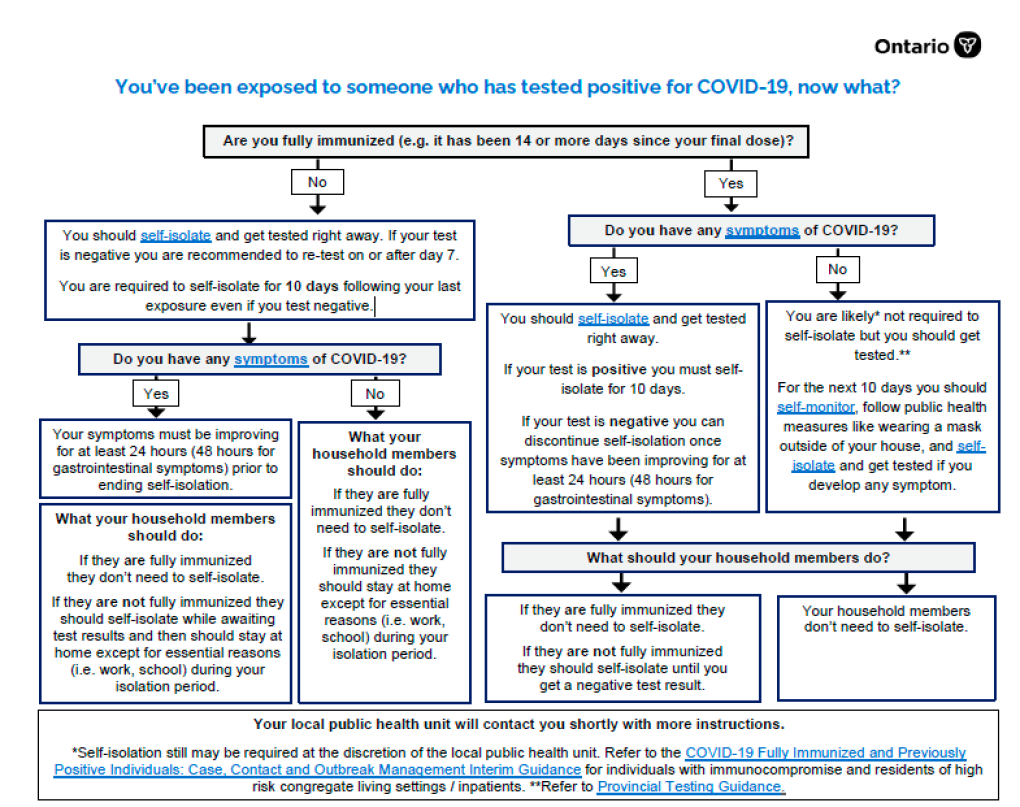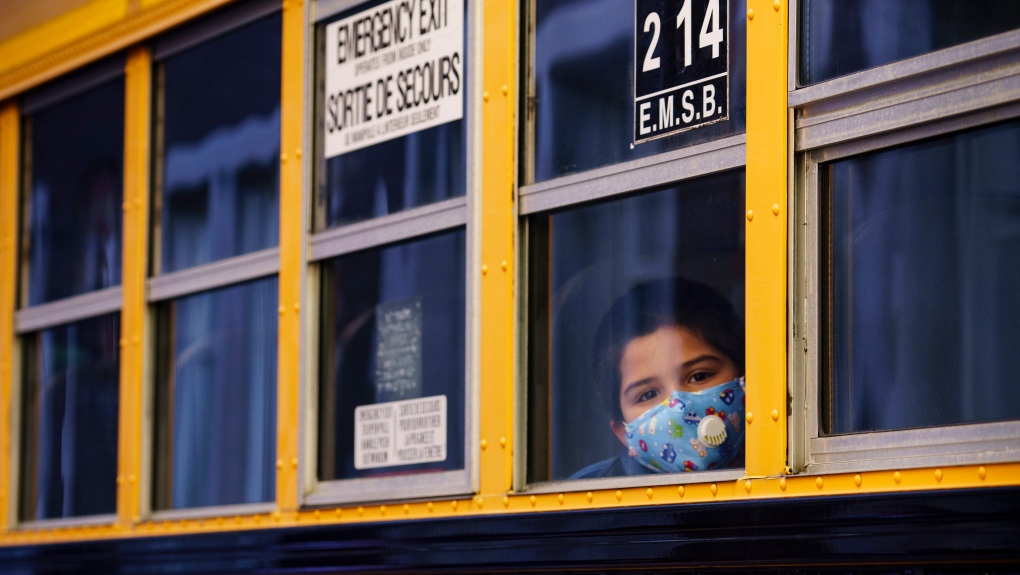Ontario now has separate self-isolation rules for vaccinated individuals. Here's what you need to know
Individuals who have not been fully vaccinated will be required to self-isolate if exposed to COVID-19 even if they test negative while those with both shots will not.
In government documents first obtained by CTV News Toronto and then later released to the public Wednesday, the Ontario government confirmed there are now different rules and procedures for vaccinated and unvaccinated individuals when it comes to pandemic health regulations.
Here are the updated rules as of August 11, 2021:
WHAT HAPPENS IF YOU ARE EXPOSED TO COVID-19?
Not fully vaccinated: Individuals who have not yet received both doses of a vaccine 14 days prior to exposure should self-isolate and get tested right away. Individuals must self-isolate for 10 days, regardless of whether or not the test returns negative. It is also recommended they take another COVID-19 test on or after day 7 of the self-isolation process.
Fully vaccinated: If a fully vaccinated individual is experiencing symptoms of COVID-19, they must self-isolate and get tested right away. If the test returns positive, they must follow similar self-isolating rules. If it is negative, they can discontinue self-isolation once symptoms have improved for at least 24 hours—or 48 hours if the symptoms are gastrointestinal.
If a fully vaccinated individual is not experiencing symptoms of COVID-19 after being exposed to the virus, they are not required to self-isolate, although they should still get a test. They may also be required to get a second test. For the next 10 days they will just be required to self-monitor for symptoms.
The document adds that “self-isolation still may be required at the discretion of the local public health unit.”
WHAT DOES THIS MEAN FOR HOUSEHOLD MEMBERS OF AN EXPOSED INDIVIDUAL?
Fully vaccinated household: A fully vaccinated household will not need to self-isolate, regardless of whether or not the exposed individual is experiencing symptoms. However, if a household member is not vaccinated—and the exposed individual is vaccinated and is experiencing symptoms—the household member will be required to self-isolate until the exposed individual receives a negative test.

Unvaccinated household: If both the symptomatic exposed individual and household members are not fully vaccinated, they will all be asked to self-isolate while waiting for test results. If the exposed individual is not showing symptoms of COVID-19, household members should stay home except for essential reasons during the isolation period.
WHAT HAPPENS IF AN EXPOSED INDIVIDUAL IS PART OF A COHORT?
The document says that in settings with cohorts such as a school, childcare or workplace, full cohorts should be dismissed in the case of potential COVID-19 exposure. It does not provide any details for how many exposed individuals would be necessary for dismissal.
Each Public Health Unit (PHU) has the discretion to return part of the cohorts based on vaccination status, prior positive status of cohort members and a risk assessment of the outbreak.
“Fully immunized and previously positive individuals may be permitted to return to the setting if the outbreak is still ongoing while maintaining all infection prevention and control measures as required for outbreak management,” the document reads.
“Unless otherwise advised by the PHU, household members of dismissed cohorts are not expected to stay at home during the period of the dismissal.”
WHAT DOES THIS MEAN FOR STUDENTS, TEACHERS AND PARENTS?
A separate document on management of outbreaks in Ontario schools was also released by the government Wednesday.
In the document entitled “COVID-19 Guidance: School Case, Contact and Outbreak Management,” the government says that asymptomatic contacts of confirmed or probably cases will not have to isolate if they are fully vaccinated, unless specified by the PHU. This includes siblings and other family members of a student who has been exposed.
The school-specific guidance indicates that asymptomatic, fully-immunized individuals may not be required to isolate following a high-risk exposure and may not need to be dismissed from class. However, that could change if immunization coverage is unknown or if the individual is in a cohort with other unvaccinated students.
 A student peers through the window of a school bus as he arrives at the Bancroft Elementary School in Montreal, on August 31, 2020. THE CANADIAN PRESS/Paul Chiasson
A student peers through the window of a school bus as he arrives at the Bancroft Elementary School in Montreal, on August 31, 2020. THE CANADIAN PRESS/Paul Chiasson
Officials also noted that all individuals who are sick, including those with symptoms not included on the COVID-19 screening tool, should stay home from school and child care.
The general advice outlined in the documents follow a suggestion made in July by Chief Medical Officer Dr. Kieran Moore that the province’s outbreak management plan for the new school year applies separate sets of rules based on vaccination status.
The general advice outlined in the document—entitled “COVID-19 Fully Immunized and Previously Positive Individuals: Case, Contact and Outbreak Management Interim Guidance”—follows a suggestion made in July by Chief Medical Officer Dr. Kieran Moore that the province’s outbreak management plan for the new school year applies separate sets of rules based on vaccination status.
At the time, he said that fully immunized students and staff would face minimal interruption from work or school if they come in contact with a "high-risk" carrier of the virus and test negative for COVID-19.
Unvaccinated students and staff, Moore said, would immediately have to isolate for a minimum of 10 days and require at least two negative COVID-19 tests, seven days apart, before returning to school.
DOES ANYTHING CHANGE AT LONG-TERM CARE HOMES?
The document says that self-isolation is still recommended in long-term care and retirement homes due to the increased risk of transmission. Even residents who are fully vaccinated and asymptomatic will be self-isolated and tested upon exposure.
“However, local public health decision-making may be applied in determining whether a resident or patient would be considered at high risk of exposure based on their vaccination status and nature of their exposure to the case,” the document says.
WHAT HAPPENS IF AN INDIVIDUAL WAS DIAGNOSED WITH COVID-19 WITHIN THREE MONTHS?
The government has said that those who have tested positive for COVID-19 within a 90-day period and have been cleared of their initial infection can follow the same rules for fully vaccinated individuals. However, the document stresses that while the risk of transmission is low, it does not mean re-infection is not possible, especially considering the emergence of variants of concern.
With files from Ashley Legassic
CTVNews.ca Top Stories

Canadian team told Trump's tariffs unavoidable right now, but solutions on the table in surprise Mar-a-Lago meeting
During a surprise dinner at Mar-a-Lago, representatives of the federal government were told U.S. tariffs from the incoming Donald Trump administration cannot be avoided in the immediate term, two government sources tell CTV News.
Pedestrian killed by Via Rail train near Kingston, Ont.
Regular rail traffic has resumed with severe delays.
Muskoka reacts to major snowfall, hundreds stuck on Highway 11
From road closures, power outages, weather declarations and nonstop shovelling, Muskoka residents were faced with nearly a metre of persistent snowfall on Saturday.
Saskatoon priest accused of sexual assault says he meant to encourage young girl with hug and kiss
A Saskatoon priest accused of sexual assault says he meant to encourage and reassure a young girl when he hugged and kissed during his testimony at Saskatoon Provincial Court Friday.
Beef prices reach record highs in Canada
The cost of beef continues to rise, reaching record highs on grocery store shelves ahead of the busiest time for many grocers and butchers before the holiday season.
Trump threatens 100% tariff on the BRIC bloc of nations if they act to undermine U.S. dollar
U.S. president-elect Donald Trump on Saturday threatened 100 per cent tariffs against a bloc of nine nations if they act to undermine the U.S. dollar.
Bob Bryar, drummer for rock band My Chemical Romance, dead at 44
Bob Bryar, former drummer for the band My Chemical Romance, has died. He was reportedly 44.
Toronto man accused of posing as surgeon, giving four women injections
A 29-year-old Toronto man has been charged after allegedly posing as a surgeon and providing cosmetic procedures on several women.
'Disappointing': Toronto speed camera cut down less than 24 hours after being reinstalled
A Toronto speed camera notorious for issuing tens of thousands of tickets to drivers has been cut down again less than 24 hours after it was reinstalled.


































